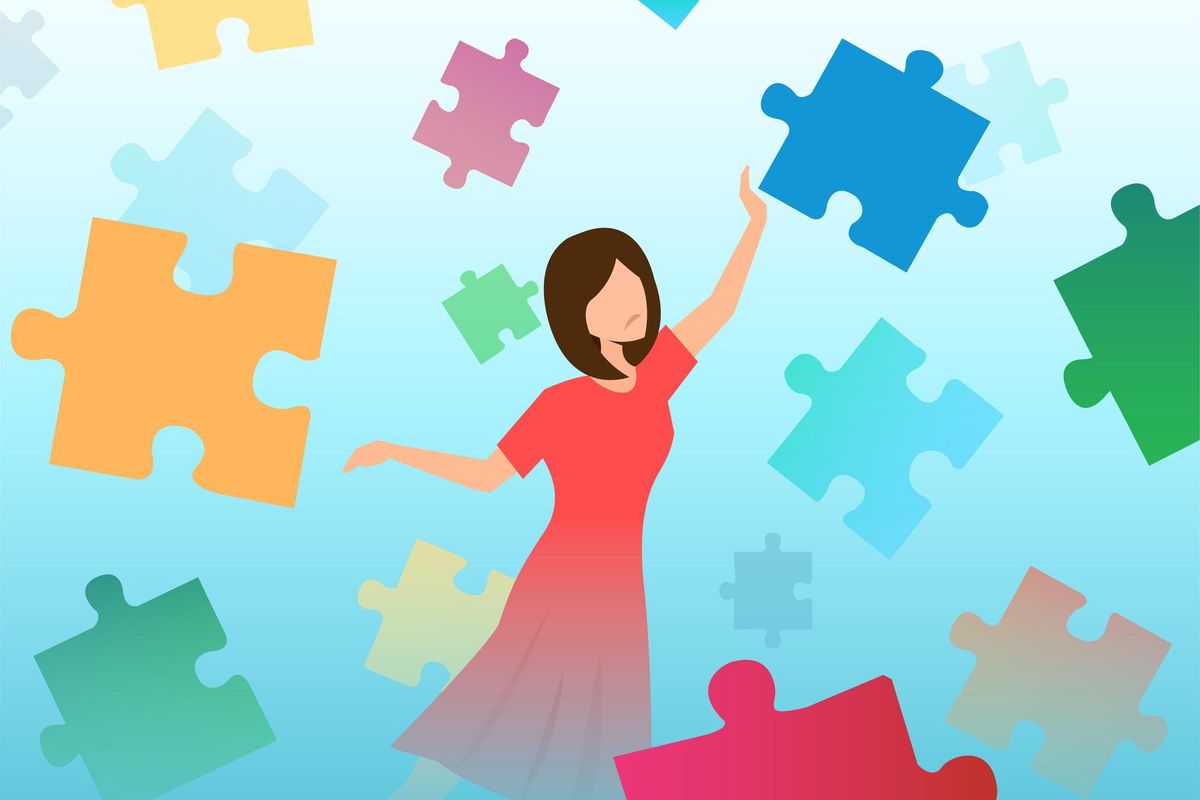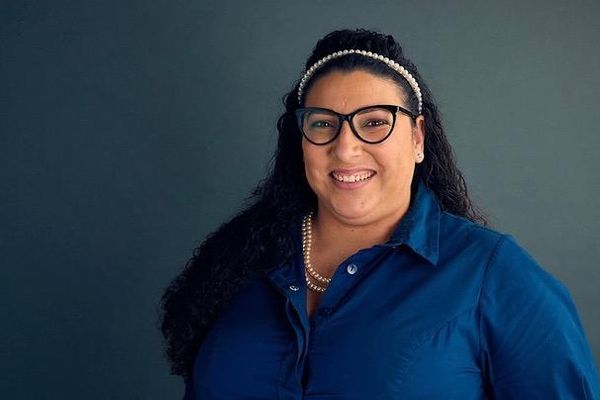Courtney Carini is a popular TikToker with over 160,000 followers and a talented dancer and small-business owner. As successful as she is, Carini knew something wasn't quite right. She found herself facing challenges her peers do not, especially regarding completing tasks on time and being able to focus. Finally, everything made sense when she was diagnosed with ADHD last year, at the age of 38.
Her undiagnosed adult attention-deficit/hyperactivity disorder — better known as ADHD — manifested as a mix of difficulty with attention, emotions and organization and made Carini feel like an outcast for 30 years. With her newfound diagnosis, she finally feels that all the pieces of her life are coming together.
In particular, Carini feels like her ADHD diagnosis helped her make sense of her dance career. Carini, who's now pursuing a bachelor's degree in psychology, initially received a bachelor's degree in musical theatre from The New School in partnership with the American Musical and Dramatic Academy. She excelled at technique but couldn't retain choreography.
"When my dance teacher would be teaching us a combination, in my head I would yell at myself, 'Be sure you're paying attention to this. Be sure you're memorizing this,'" Carini told HealthyWomen. She added that the irony of the situation was that she paid so much attention to this voice in her head that she couldn't listen to the choreography instructions. Without the choreography, Carini couldn't demonstrate her top-tier technique to her professors, who in turn belittled her.
Carini's struggle with choreography is an example of an adult manifestation of distractibility, a central symptom of ADHD, according to Maurissa Abecassis, Ph.D., an assistant professor of psychiatry at Dartmouth's Geisel School of Medicine and director of adult neuropsychology at Hanover Psychiatry in New Hampshire.
Surprisingly, in adults, distractibility often presents as paying too much attention to irrelevant thoughts; whereas, in children it often manifests as paying too much attention to external stimuli, such as sounds, Abecassis said. ADHD is stereotypically associated with boys, but the condition also affects young girls and, as Carini's case illustrates, adults.
ADHD, formerly known as "ADD," was renamed in the fourth edition of the Diagnostic and Statistical Manual of Mental Disorders (DSM), which is the American Psychological Association's handbook that healthcare professionals use to make official psychiatric diagnoses. Now, ADHD is partitioned into three subtypes: predominantly inattentive type, predominantly hyperactive/impulsive type, and combined type. The term ADD, while still widely used conversationally, is no longer formally recognized as a diagnostic term.
Research has come a long way since ADHD was first identified in the 1960s and thought to be a children's disorder. Now, we know that ADHD is a neurodevelopmental condition that can last throughout an individual's lifetime, and its symptoms persist and present differently in every stage of development.
What is ADHD?
Adult ADHD symptoms include difficulty paying attention, poor time management, trouble coping with strong emotions and impulsivity. Those with ADHD may also face secondary challenges such as unemployment, financial and legal problems, substance misuse, and poor self-image, as well as mental health issues like depression and anxiety.
Most people experience ADHD symptoms from time to time. However, Abecassis said that individuals who qualify for an ADHD diagnosis experience much more than fleeting attention struggles. Their symptoms are long-lasting, pervasive and hinder their day-to-day lives.
How is adult ADHD diagnosed?
Diagnosing ADHD in adults can be tricky because the symptoms are often similar to other conditions, such as mood disorders or anxiety.
Another challenge to diagnosing ADHD in adults is that the diagnostic criteria in the DSM are mostly applicable to children and can be ineffective for diagnosing adult ADHD, according to Abecassis. However, the latest edition of the DSM does have some symptom modifications for adults. For example, the DSM-5 describes hyperactivity as "often on the go" or "driven by a motor" for children. But, hyperactivity presents differently in adults, so the modified description is "feels restless."
There is no single diagnostic test that can confirm an ADHD diagnosis. Doctors may ask patients to complete an array of tests, provide academic or medical records as well as a developmental history, and gather information from a parent or a partner to help identify diagnostic criteria.
Getting the necessary supplemental information together for an ADHD diagnosis can be challenging, but it is essential to a sound diagnosis.
How common is ADHD in adults?
ADHD in adults is often underdiagnosed, but we do know diagnosis rates are on the rise. A 2019 study found that adult diagnoses more than doubled between 2007 and 2016: from 0.43% to 0.96% of the population.
Currently, there is not enough evidence to suggest that ADHD is more prevalent in one gender than another in adults, but gender-based differences in ADHD diagnoses are well documented in children. Abecassis said boys are more likely than girls to be clinically referred for an ADHD evaluation in childhood, which may explain why boys are more commonly diagnosed with ADHD than girls.
The diagnosis rates between adult men and women are more balanced. "More women and healthcare providers are also recognizing and becoming aware of how ADHD presents in women," Abecassis explained. "It is also the case that women, less likely to be referred for ADHD evaluation in childhood, may have developed some strategies to manage difficulties but as challenges/role expectations increase, they may have greater trouble coping, which prompts them to seek evaluation."
Abecassis added that transitional periods, such as the transition to college, work or motherhood, appear to be distinctly pivotal times for women to uncover the signs of undiagnosed ADHD.
What treatment options are available?
Stimulant medication is the most common approach to treating ADHD, and it is widely regarded to be the most effective treatment.
Healthcare providers (HCPs) may also prescribe nonstimulant medication or antidepressants as an alternative to stimulants. Additionally, while talk therapy may not be enough to treat ADHD on its own, it is a helpful addition to many treatment regimens. People with ADHD can also improve weakened skill sets such as organization, long-term concentration, and controlling impulsive behavior with the help of therapists or professional ADHD coaches.
While ADHD does not cause any other psychological or developmental problems, it is often accompanied by a host of other comorbid disorders such as anxiety and depression, which can make treatment more challenging. Abecassis recommends discussing ADHD management options with your HCP because there are a wide range of helpful treatments, and it is never too late to experience their benefits.
The importance of being diagnosed with ADHD
"Inattention in girls and women with ADHD may present as being easily distracted, disorganized, overwhelmed and lacking in effort or motivation," Abecassis said.
These symptoms can create profound impacts on women's lives. For example, Carini described having to unlearn 30 years of compounded "ADHD trauma."
"By trauma, I mean being called lazy, stupid, spoiled — and believing it," Carini explained. "I feel like that was what stunted me — it was the adults around me who had no idea what [ADHD] was and misinterpreted it as me being stupid, lazy and spoiled with a bad attitude. So I always felt misunderstood."
It can be tremendously helpful and empowering to know you're not inherently flawed, but you just have a condition that needs to be understood and managed.
"Once I had that knowledge [that I had ADHD], it in itself told me that I am all the good things that I thought I was," Carini said.
Resources:
CHAD, Children and Adults with Attention-Deficit/Hyperactivity Disorder
ADHD Resource Center, American Academy for Child and Adolescent Psychiatry
- Coping with Adult ADHD ›
- Could It Be Adult ADHD? - HealthyWomen ›
- I Was Diagnosed With Adult ADHD. Here's What I Learned ... ›
- Attention Deficit Hyperactivity Disorder (ADHD) - HealthyWomen ›
- My Adult ADHD Diagnosis Changed How I Parent My ADHD Kids - HealthyWomen ›
- As an Adult, I’ve Finally Made Peace With My ADHD - HealthyWomen ›
- Living with ADHD Has Taught Me How to Be Perfectly Imperfect - HealthyWomen ›







